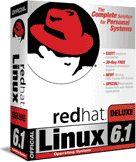PENGUIN SHAPES UP TO GIANT Red Hat Inc, the biggest packager of Linux Operating System is about to ramp up its campaign of acquisitions, partnerships and activity in the open-source community. Its no secret that the Linux community has always seen itself as an alternative to Microsoft Windows, the competition between MS and Red Hat is transcending words and rapidly moving into deeds. The Linux provider Red Hat plans a major investment in Mozilla, which was created and funded by Netscape Communications Corp. way back in the early 90's. A move as early as Jan2000 will accelerate future browser development. Since America Online Inc.'s acquisition last year of Netscape, a major upgrade to the browser has been fraught with delays, and now it lags behind Microsoft's Internet Explorer. Red Hat is also in close negotiations with messaging platform vendor Sendmail to significantly extend the pair's relationship through shared support services and even cross-engineering efforts, Sendmail officials said. Red Hat will consider development partnerships with any and all open-source projects, avowed Chairman Bob Young, who has said, only half-jokingly, that his company is bent on achieving "world domination, and fast." Riding on the back of a lucrative public float Red Hat purchased Cygnus Solutions, an open-source vendor that makes widely used GNU compilers and other open-source development tools. That acquisition, valued at about $700 million in stock, doubled Red Hat's work force. Also this month, Red Hat partnered with RSA Data Security Inc. to license security technology. Those moves are just the beginning, according to Young. "We absolutely have to be aggressive for our customers," Young said last week. "Our competition is not the other Linux distributions. Our competition is with Microsoft." There have been a litany of would-be challengers to Microsoft who have been left floundering in MS's tsunami-like wake as it plows through the software industrial sea. Its by no means certain that the US justice system will slow MS down either. However, the forces of nature dwarf that of any human, even Bill Gates, a storm of consumer acceptance of Linux is looming ever larger every day. There is nothing like a common adversary to unite disparate forces. Red Hat has taken control of 55 percent of the U.S. Linux market, with the next closest competitor at 10 percent, according to International Data Corp., of Framingham, Mass. Such a dominating presence could become anathema to the open-source community. Some argue that a primary Linux provider would be a boon to enterprise users considering the platform; others are less sure. "Our customers keep telling us they want choice," said Tom Figgatt, global executive with IBM's Netfinity division, in Somers, N.Y. "They were looking for choice when they came to Linux in the first place. That doesn't go away." |

